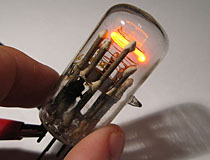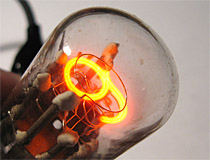| National Union GI-10 Inditron Nixie Tube | |
| Written by AnubisTTP on 2007-05-28 |
|
  |
The GI-10 'Inditron' is an historical curiosity, a Nixie-style numerical indicator tube which was developed in parallel to the more successful Burroughs Nixie, and may actually predate the Burroughs Nixie by as much as a year. Beginning in 1954, National Union produced a small number of neon-filled indicator tubes which used bent wire cathodes to indicate a numeric value. The tubes had very short operational lifespans and were difficult to drive with the then existing technology, which prevented widespread use and ultimately doomed the tube to failure in the market.
The primary difference between a GI-10 and a Burroughs-style Nixie tube is the lack of an anode grid. With no anode grid, the GI-10 is rather difficult to drive; an adjacent cathode must be pulled high to start the glow discharge. The GI-10's wire numerals look quite different from the stamped metal numerals used in the Burroughs design, and are much more prone to failure. The unusual 10-pin base is designed to fit into a modified 9-pin socket with a metal bushing around the hole in the center. The long pin in the center of the tube protrudes down the hole, and a spring on the side of the pin engages the bushing, allowing a common 9-pin socket to function with a 10-pin tube.
Special thanks to Randall Logan for providing an excellent scan of the GI-10 datasheet.

Wow, this thing is weird.

National Union GI-10, side view.

The GI-10 uses bent wire cathodes instead of the stamped plates common in later nixie tubes.

A short announcement from the September 1954 issue of Popular Science covering the GI-10.

A portion of the GI-10 patent, detailing how to construct a 'Nixie' clock using the displays.
 Return to Nixie & Gas Discharge Displays
Return to Nixie & Gas Discharge Displays









 Return to Nixie & Gas Discharge Displays
Return to Nixie & Gas Discharge Displays